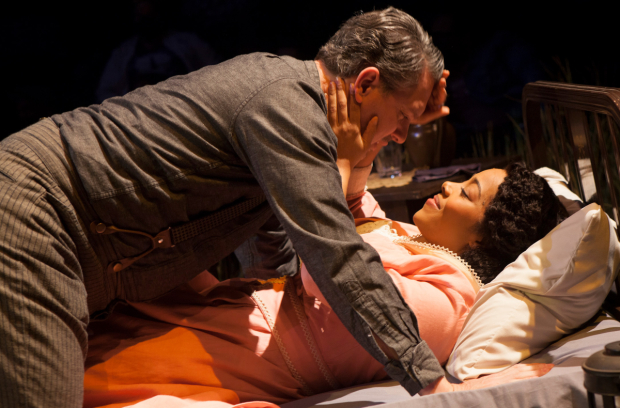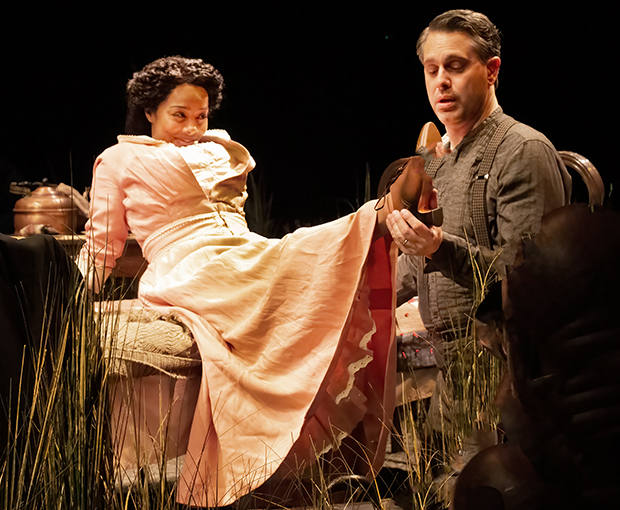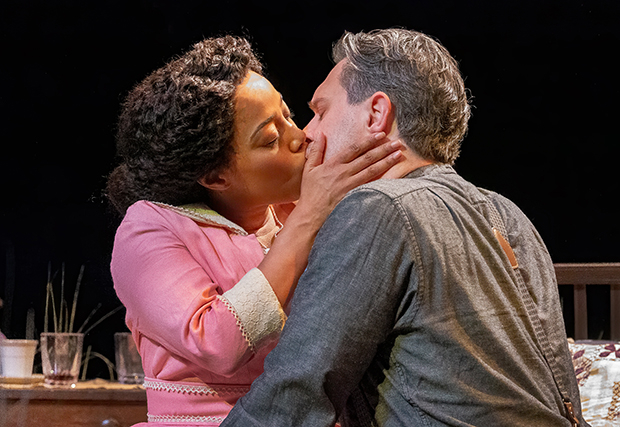Interview: Brittany Bradford and Thomas Sadoski on Introducing Alice Childress's Wedding Band
Theatre for a New Audience presents this rare revival of Childress’s 1972 drama about an interracial romance at the turn of the last century.
At the Polonsky Shakespeare Center in Brooklyn, in a Theatre for a New Audience production, New York City is getting an extremely rare revival of Alice Childress's 50-year-old play Wedding Band: A Love/Hate Story in Black and White. Set amid the 1918 flu pandemic, the drama addresses racial prejudices and ignorance as it follows the romance of an interracial couple in South Carolina.
Leading the cast of Awoye Timpo's revival are Brittany Bradford and Thomas Sadoski, who take on the central roles of Julia and Herman. Here, they tell us about putting the play together and its importance.

(© Hollis King)
This conversation has been condensed and edited for clarity.
Brittany, tell me about Awoye Timpo's organization Classix, the company in residence at TFANA, of which you are a part.
Brittany Bradford: Classix is basically about exploding what we consider a classic and who gets to be included in that and who isn't. A lot of the time, it's at the detriment of Black plays and playwrights. We have a lot of initiatives: one is bringing Black plays and playwrights to the fore, people like Alice Childress or Kathleen Collins or Bill Gunn or Ed Bullins, and there's also a huge educational component to it. We are partnered with schools to talk about the curriculum and which plays are being taught and why, and how they can add in more of these Black playwrights. We have a podcast series that explores different moments of Black theater history, and we are also trying to make sure that we publish or find out where the rights are for a lot of these plays, because sometimes the big issue is who has controls of the scripts. It's all about branching out and trying to be expansive about how we're thinking of these creators.

(© Henry Grossman)
Alice Childress is a playwright who is not part of the theatrical creative consciousness, and this play isn't either. What is it like to bring it to the forefront?
Thomas Sadoski: Look, I have to be honest. The fact that Alice Childress isn't taught more often, the fact that I went to a theater school, the fact that most people that I know who have gone, not only to undergrad, but to grad school, with very, very rare exceptions — there's very little that I can think of that is more shameful, in terms of our artistic community, than the fact that a playwright who is that exquisitely talented and who has written such important pieces of theater has gone largely unrecognized for as long as she has.
And I think it's even more shameful that across the street from where we are doing this play, which is an important piece of the American experience in the American theatrical canon, you can't even get a fucking ticket to see Cyrano with a British cast. That is shameful. The vast majority of people would be happier to retweet a Ta-Nehesi Coates quote but can't be bothered to walk across the street to see a Black playwright talk about the Black experience. I'm a little bit — I don't know that I'm necessarily afraid to say that sort of thing out loud to a journalist as much as I am pissed that it has to be said. It really pisses me off, and I apologize, Brittany, for running at the mouth about it.
Brittany: No, no, no. I think what it is for both of us is, I feel very protective of not only this play, but of Alice Childress, specifically. The more that we've learned about her, the more I can see her influences on so many other playwrights. You can see the genesis of Slave Play in this, you can see Jackie Sibblies Drury's work. You can see August Wilson's work. When you think about how long she wrote, of course she influenced a lot of these people. We talked about Sidney Poitier in rehearsal, and what a big influence she was on him, and yet her name isn't the one that's said. And that's the part that does feel shameful.
I've never promoted a show in my life as much as I have this, because I want people to come see it. Not because of our performances — even though I think Tommy is extraordinary in this and Veanne Cox and our whole entire cast is ridiculous — but you can't leave without wanting to go read every single one of Alice Childress's plays and get every single one of them produced.
Thomas: I've been in plenty of shows throughout my career where people are like, "Hey, I'm going to come check out this show," and I'm like, "Cool, cool," but this is one of those ones where I'm actively texting people on the daily to come see this. I'm immensely proud of this production.
There was a young man at the show last night, a theater student who said that he had discovered, on a recommendation, the last scene of our show as something to study in one of his scene-work classes. And he was saying, like, "I don't know that I'll necessarily need to study anything else in order to learn how to be an actor." In the course of the last scene of this play, it demands of you as an actor a level of egolessness and honesty, and a willingness to just put it all out there without trying to look good. She wrote without ego, she demands performances without ego, and it requires so much out of its audience in a beautiful way, but it's also gentle and loving and kind in a way that you just don't see at this level, and we missed it as a community. It's crazy to me.
Brittany: It's the same with the first scene. I'm kind of shocked by how many people are obsessed with the first scene between Herman and Julia. I mean, it's a beautiful scene, but so many people have said that they've never seen a writer write so well what a 10-year relationship would be. There is a lived-in quality to the writing of these people, and you don't realize until you get to the end of the play how much you need it. It's easy for writing now to feel like extra stuff is added in, but here, everything is so purposeful. The humor is there where you need it, it's wonderfully structured and it has incredible heart and emotionality to it.

(© Henry Grossman)
What it is like to be doing a play that is about an interracial relationship, racism, and, of course, the 1918 flu pandemic, as actors in 2022, on this scale?
Brittany: It's twofold. Tom and I have talked about coming out of the pandemic and having different priorities. There's a different type of art that I want to make, and it's not even different – it's the exact art that I've always wanted to be part of, but I think I am more willing to put a stake in the ground, not going against my own code. The timeliness of the piece with the pandemic and everything is there too, but what I think about most is Alice Childress and all the factors that have always been against her, and her plays being produced. There's always something that made it so difficult for the work to be done, whether it's Trouble in Mind or Wedding Band, and more than anything, it should always be done, and I just want to be part of that process.
Thomas: I couldn't agree more. What is it like to be an artist given the opportunity to do this, given the relevancy of it? It's a challenge. Not a challenge in the sense that it demands of us extraordinary work, although it does, but because it throws down the gauntlet and says, "This is art of its time. What are you going to make of it?" That rarely comes along, and I feel humbled to participate and introduce Alice to a population that is relatively unaware of her.
It feels like the gauntlet is being thrown down by the artistic gods to the community as a whole and saying, "Do you really love this thing called theater? Cause if you do, here it is." We need asses in seats. We need people to put their time and support where their mouths are. This is the stuff that people need to be showing up for. Where are you?









